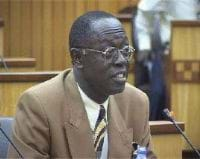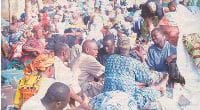Political Parties, IEA Propose State Funding Of Political Parties Website
A proposal by the Ghana Political Parties Programme (GPPP) and the Institute of Economic Affairs (IEA) for public funding of political parties in Ghana will be launched in Accra on Wednesday. Members of the GPPP are the New Patriotic Party (NPP), the National Democratic Congress (NDC), the Convention People's Party (CPP) and the People's National Convention (PNC), the four parties with representatives in Parliament. The main feature of the proposal is the establishment of a Political Parties Fund into which two and half per cent of the total tax revenue of Ghana will be paid, to be administered by the Electoral Commission (EC) for the sustenance of political parties in Ghana. According to the document, it was hoped that with its subsequent passage into law and the consequent establishment of the Political Parties Fund, the political parties would be strengthened to play their proper roles in the multi-party constitutional governance of Ghana. Other features include a formula for the disbursement of the fund, comprising re-imbursement for electoral expenses and general administration, as well as provisions to encourage political parties to field women• candidates in elections. The fund is exempted from tax, while provision has been made for the annual audit of the fund and annual reports on it to be presented to Parliament. Already, the proposed draft bill has been accepted by the four political parties which form the GPPP and signed in attestation at a public ceremony held on October 10, 2007. The EC, for its part, has accepted to manage and administer the fund once the bill is passed into law. The next step, according to an official at the IEA, was to submit the draft bill to the Attorney-General with a request for him to sponsor it to Cabinet and Parliament for enactment. With the finalisation of the draft Public Funding of Political Parties Bill, the IEA and the GPPP have once again played a model role in growing, consolidating and entrenching Ghana's democracy. Giving a background to the proposed bill, an IEA official said in a multi-party democracy, political parties performed key roles in the formation of the government, grooming leaders at national and sub-national levels, holding governments accountable (when the parties were in opposition), among other things. "Yet political parties are among the most neglected of the political institutions of state. They are made to operate as if they are purely private organisations, with no state or national interest in their establishment, maintenance, well being and extinction," the official stated. Accordingly, he said, by their very nature, poorly established and poorly maintained parties produced poor quality leadership, both at the party level and at the government level. "For these reasons, it is important to ensure that political parties are not just electoral machines for achieving electoral victories but also function effectively as vehicles for public education, leadership training, national integration and skills acquisition during inter-election years," the IEA noted.
Source: MJFM







